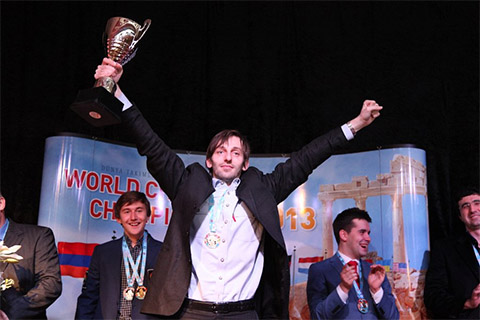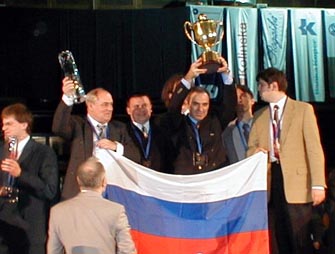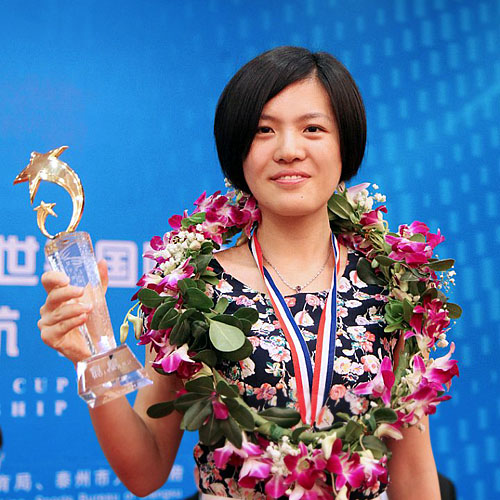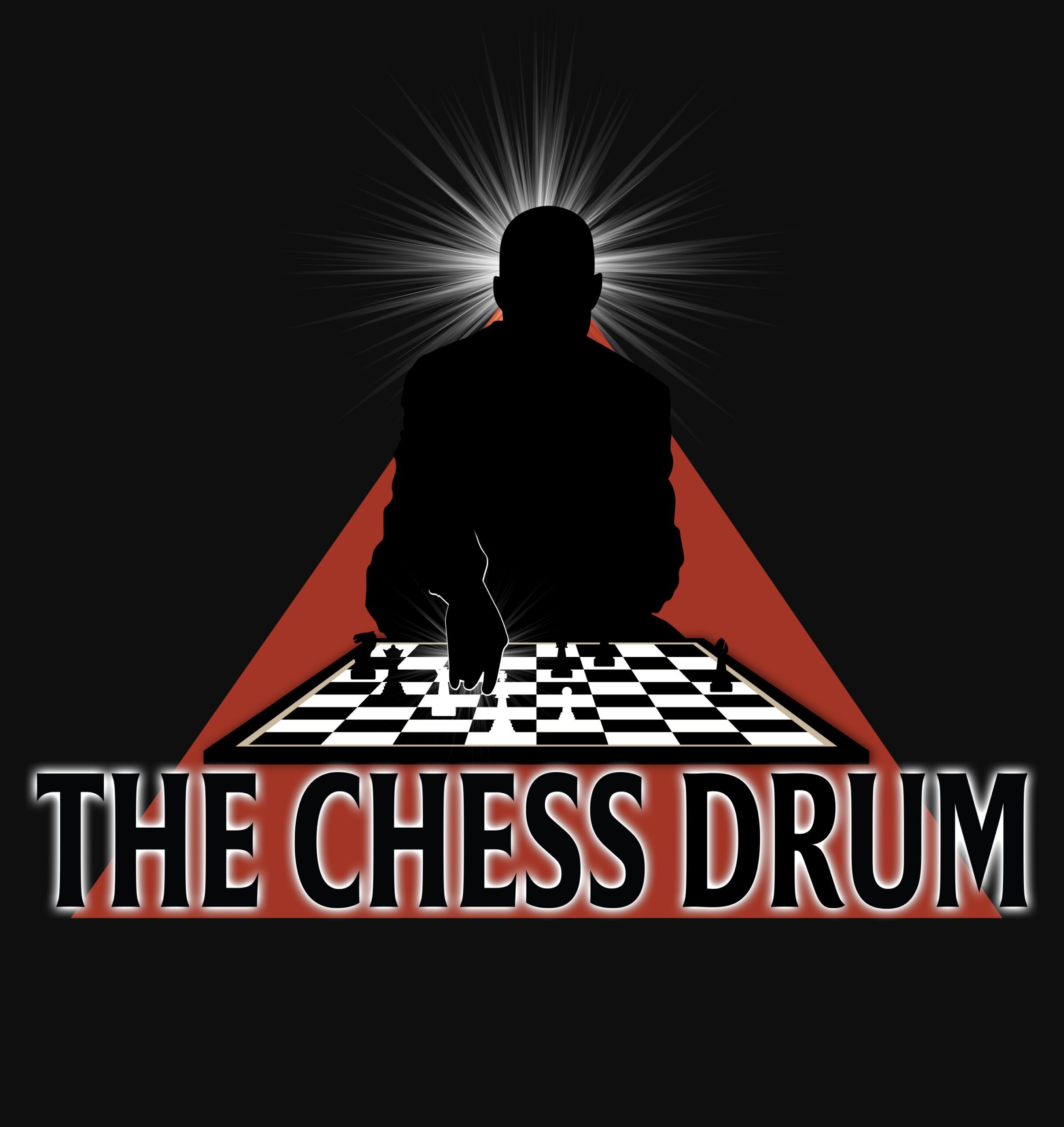Russian chess attempts to reclaim glory
Coming off of a “must-win” in the World Team Championships there has been an aggressive effort to reclaim the glorious past of the “Russian School of Chess”. However, has that era passed for good or is Russian ripe for a resurgence? In the win during the World Team, there was nothing new in terms of a breakout performance. Three Russians earned individual medals and had the most stability during the event. The question remains why has Russian failed so miserably with a 12-year gold medal drought in the more competitive Olympiad tournament?

After winning World Team, can Russia reclaim Olympiad glory?








The truth of the matter is despite Russia’s impressive collection of talent, strong players are being developed around the world and the balance of power has been dispersed from Euro-America into other parts of the world. China and India certainly have met a surge in talent as have smaller federations such as the Philippines and Vietnam all having produced elite players. Looking at other nations such as Cuba, and to lesser degree, the improvement of Iran and Turkey we can see a crop of young players emerging. Even countries such as Venezuela, Peru and Egypt have produced credible talents.
Vladimir Kramnik complained about the lack of young talent emerging in Russia. During an interview at the Dresden Olympiad in 2008 he opined,
With regard to Russia I am not aware of the most recent developments; actually it is Evgeny Bareev who is working with the main players in his school. But unfortunately I don’t see much talent coming from our country and this is scaring for me as we shall not get any younger. Some of the players in this team already played in 1994, so you need some new blood at some point and at the moment I can’t see who can bring some new resources to the team. OK, we have some good players such as Malakhov, we have Jakovenko, but they are not much stronger than the rest of the guys. Bareev is already 40 you know, but I hope that he will be able to prepare in his school some young players for the Olympiad in two years time in Dresden. (full interview)
Five years later, what is the situation with Russian chess. They added Sergey Karjakin in 2009 who bolted the Ukraine for better support of his career. He won his first medal at the World Team. Alexander Grischuk is now 30 and Evgeny Tomashevsky and Nikita Vitiugov are 26. This is not exactly old, but not considered young in chess terms. You have a cadre of under-25 players such as Karjakin, Ian Nepomniachtchi, Dmitri Andriekin and Maxim Matlakov all of whom are 23 and 2700-strength. There appears to be a strong nucleus of Russian talent. So what is the problem?


Russia celebrates its gold medal in the 2002 Olympiad in Bled, Slovenia. Despite fielding powerful teams, they have not struck gold since that event. Photo by Jerry Bibuld.
Garry Kasparov has commented on this and believes it has to do with both “lack of structure” and with the decreasing support of the sport. It was widely known that during the Soviet days, chess received a sizable largess from the Ministry of Sport. Today there is a different tone and perhaps Kasparov has a political agenda in showing Vladimir Putin’s lack of chess support, but his comments are telling. In a 2012 interview, he stated,
“Russia is no longer a dominant force. Not surprisingly, the center of chess has moved south of Moscow. The three most advanced countries now in the world of chess are Armenia, Azerbaijan, and Georgia. Chess is almost dead in the Baltics, which was also once a very vibrant chess community. What you need for chess, if you want strong players, is either private donors or strong state institutions. If there is state support for chess as a game or as an educational tool, you can see the results.”
He adds,
“To the contrary, Putin’s regime doesn’t trust intellect. Anything intellectual is treated with great suspicion. And chess is quite intellectual, so the game is pushed to the back stage. We still have talented players, but there’s no infrastructure. If you look at the amount of money Russia spends on football, or soccer, it’s very different. There is nothing that stops any country with a certain amount of money invested from showing great results.” (full interview)
So Chess-in-Schools is what Kasparov is touting as the map to provide structure to chess improvement. Both China and India have different ideas of how to harness talent with the former relying on government support and the later relying on corporate support. Armenia has enjoyed tremendous team success in a nation of three-million.
Armenia has won bronze in Bled (2002), bronze in Calvia (2004), gold in Turin (2006), gold in Dresden (2008) and gold in Istanbul (2012). Russia has gotten three silvers in the same period (2004, 2010, 2012). What makes Armenia different of course is the support from the government and their country’s President Serzh Sargsyan who is also President of the chess federation no less! The team has incredible chemistry and camaraderie and this can be seen when observing them.


Russia women are 2012 Olympic Champions! However, the Kosintseva sisters caused a sensation by protesting against captain Sergei Rublevsky. Nadezhda Kosintseva (pictured left) has not been very active in months (played in Dallas GM Invitational last month), married Leonid Kritz and is living in the U.S. What will 2014 look like?
For Russia, there has been all types of internal tension culminating in resignations by Evgeny Bareev and accusations of abuse by Sergei Rublevsky on the women’s team. There is also the added pressure of being the highest-rated team in every event. However, the chess world is a different place from 30 years ago when Kasparov began his quest as World Champion.
Nevertheless, Russia is desperately trying to reclaim its glory and will have 4/8 players in the March 2014 Candidates to challenge Carlsen. Russian organizers chose 7-time Russian Champion Peter Svidler as the wildcard instead of young stars Hikaru Nakamura or Fabiano Caruana to bolster their chances.
In 1985, Garry Kasparov was World Champion and USSR/Russia would put together a string of 12 consecutive Olympiad gold (1980-2002). Today, the top 20 players are led by World Champion Magnus Carlsen of Norway with an amazing 15 nations represented in this list including Asia, Western Europe, Scandinavia, Latin America and the U.S. Today China is #3 and India is #8 and Cuba is #18.
In Tromso, Norway, the 2014 Olympiad will include a Presidential election. It may represent a changing of the guard not only in the political structure of FIDE, but also the balance of power. China will certainly be a force after scoring a silver in the recent World Team. Their women have been dominant in the Olympiad for two decades winning four gold, three silver and four bronze since 1990. Chinese have also had five women’s World Champions (Xie Jun, Zhu Chen, Xu Yuhua, Hou Yifan (twice)). However, Russia is that reigning two-time Olympiad champion.


Photo by Anastasia Karlovich.
Russia still has what it takes to become a dominant force but what is perhaps missing is the structure that Kasparov mentioned. Led by Vladimir Kramnik, who is in the sunset of his career, Russia has a wealth of talent without question. The larger question is whether they can reinvent a winning chemistry or whether the other federations closing the talent gap too quickly. Time will tell and the Tromso Olympiad will be an important one for many reasons.


One Comment